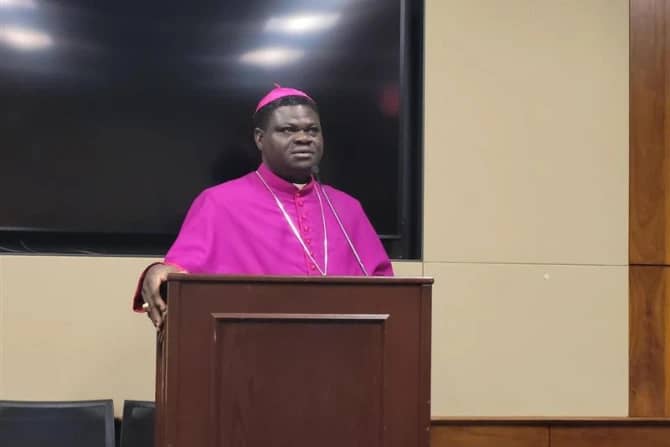Daniel Otera
At least 15 parishes in Benue State’s Makurdi Catholic Diocese have been forcefully shut down following renewed waves of attacks by suspected armed herders. The violence, according to church leaders, has left scores dead, razed entire communities, and displaced thousands raising grave concerns about security failures, religious persecution, and what many believe is a calculated attempt to silence voices exposing the atrocities.
Rev Fr Joseph Beba, Chairman of the Nigerian Catholic Diocesan Priests Association (Makurdi Diocese), disclosed the figures on Sunday while addressing journalists at the Catholic Cathedral in Makurdi. He cited recent attacks on communities such as Tse Orbiam, Ahume, Jimba, Nagi Camp, Aondoana, Yelewata, and Abegana. According to him, more than 50 people including women and children have been killed in the past fortnight alone.
“The affected parishes are completely deserted,” Fr Beba said. “Communities like Jiba, Mbalom, Yelwata, and Aondona have been sacked. Priests and parishioners have fled. These were thriving parishes now, nothing is left.”
Fr Beba linked the timing of the latest attacks to Bishop Wilfred Anagbe’s recent testimony in the United States and Europe. The bishop had presented a paper on the systematic persecution of Christians in Nigeria, specifically in Benue, a state that has suffered some of the worst attacks in Nigeria’s Middle Belt region.
“These attacks are a direct response to the bishop’s voice abroad,” Beba claimed. “They are trying to intimidate him and the Church.”
Fr Beba also accused security forces of complicity or, at best, negligence. He referenced the shooting of Rev Fr Solomon Atongo on 24 May 2025, just three kilometres from Naka and less than 500 metres from a military checkpoint. “Despite cries for help, there was no intervention”, he said.
Bishop Wilfred Chikpa Anagbe, who leads the Makurdi Diocese, recently warned that the prolonged closure of schools and churches in attacked communities could produce a generation of radicalised and uneducated youth.
“Schools in these areas have been closed for over 10 years,” he lamented. “What we are breeding now is a group of future bandits and terrorists. The children now have no education, no formation, nothing.”
Speaking during the 7th International Theological Conference of the Institute of Consecrated Life in Africa, Bishop Anagbe decried government inaction and expressed frustration at a national leadership that appears to have “neglected its constitutional role.”
“Benue is the epicenter of these attacks. I have lost 14 to 15 parishes. When I say parishes, I mean large areas with up to 20 outstations covering 20 to 25 kilometres. The demography of the Diocese is shrinking,” he said.
While Makurdi is currently at the epicentre, Bishop Anagbe noted that similar patterns of insecurity and parish closures are emerging in Otukpo and Katsina-Ala dioceses other Catholic territories in Benue State.
“The Church is under siege,” he warned. “It’s not just about the Church, it’s about the soul of Nigeria.”
Anagbe, a member of the Missionary Sons of the Immaculate Heart of Mary (Claretians), also warned that the failure to secure rural farming communities is driving hunger and food insecurity nationwide.
“Our people are not beggars. They just want to return to their farms. It is not about distributing food in IDP camps that is not a solution. These people want dignity.”
Church officials have continued to allege that Nigerian military and security operatives stationed across affected communities have failed to respond to attacks sometimes even when they occur nearby.
“We observed with dismay the low energy of the Nigerian army,” said Fr Beba. “The refusal to go after attackers betrays professionalism. It speaks of complicity.”
Bishop Anagbe echoed similar sentiments, arguing that if Nigeria could send troops to keep peace in Sierra Leone and Liberia, then it could protect its own people if it wanted to.
“You can’t tell me these bandits are stronger than the Nigerian army,” he said. “Some leaders are deliberately refusing to mention the criminals.”
Rev Fr Beba called on President Bola Tinubu and Benue State Governor Rev Fr Hyacinth Alia to take immediate and decisive action.
He demanded the declaration of war on armed herders, insisting that the violence is no longer sporadic but “systematic and targeted.”
Fr Beba also backed the governor’s earlier claim that many of the attackers are non-Nigerians, calling for tighter border control and a unified national response.
In a charged appeal to young people in the state, Beba said, “Youths must prepare to defend their faith, their lands, and their way of life. The right to self-defence is an inalienable one for all citizens.”
Benue State, often described as the “food basket of the nation,” now hosts one of the highest numbers of internally displaced persons (IDPs) in Nigeria. According to the Internal Displacement Monitoring Centre (IDMC), over 1.5 million people have been displaced in the state, mostly due to violent rural attacks by suspected herdsmen.
A 2024 report by Open Doors International revealed that over 4,000 Christians were killed in Nigeria in 2023 alone 90 per cent of all documented Christian killings globally.
Benue remains among the top five Nigerian states most affected by the herder-farmer conflict, according to a ReliefWeb conflict analysis.
Since 2013, hundreds of churches have been destroyed or abandoned in central Nigeria, with Catholic World Report estimating that over 19,000 churches have been attacked nationwide since the insurgency began in 2009.
For the Makurdi Diocese, the loss of 15 parishes is not just a religious issue. It is a humanitarian, security, and political emergency.
“What is happening in Benue is a test of Nigeria’s soul,” said Bishop Anagbe. “We will keep praying. But prayers must be followed by action by leadership. Until then, our people will keep fleeing, and our nation will keep bleeding,” he added.

